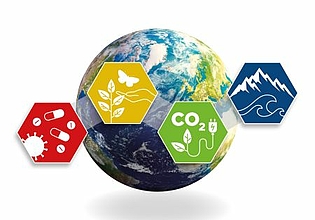G7 and G20 Policy Advice
G7 Statements 2022

Image: Sisters of Design
In preparation for the G7 Summit of Heads of State and Government in June 2022, the science academies of the G7 states, under the leadership of the Leopoldina, have developed joint statements. They were handed over to the German G7 Presidency and presented at the Science7 Dialogue Forum on 31 May 2022.
Key topics of the statements prepared under the leadership of the Leopoldina are the effects of climate change on polar regions and ocean, measures for decarbonisation, the development of antiviral drugs for pandemic preparedness and the need for a One Health approach to address zoonoses and antimicrobial resistance.
Ocean and Cryosphere
Ocean and cryosphere act as one of our planet’s most efficient early warning systems for climate change. Both in Antarctica and Greenland, ice loss has strongly accelerated. The rate of sea level rise has more than doubled in the last two decades. Warming and acidification of the ocean have significant impacts on the global climate. The permafrost thaw further intensifies global warming. In view of these dramatic developments, the G7 Academies call for a massive reduction in greenhouse gas emissions, the global protection of marine ecosystems, the engagement of all forms of knowledge for solutions, and the enhancement international scientific cooperation and data sharing for an Earth observation and forecasting system.
Decarbonisation
Decarbonisation is central for achieving the goals of the Paris Climate Agreement, in which 196 countries have committed to significantly reduce their greenhouse gas emissions in order to limit global warming. This includes the expansion of renewable energies for electricity generation and the decarbonisation of traffic and transport as well as entire industries. Significant emission reductions in agriculture are critically important. To accelerate the transition to a world with net zero greenhouse gas emissions, the G7 Academies call for building a carbon-neutral and resilient energy system, strengthening international cooperation towards a just energy transition worldwide by introducing a renewable energy trading system and a global CO2 pricing mechanism, strengthening climate literacy and citizen involvement, and promoting technological and social innovation towards climate neutrality.
Antiviral Drugs
The widespread availability of antiviral drugs that can be used in addition to prophylactic vaccines in the event of a pandemic is a key component of effective pandemic preparedness. Experience with the COVID-19 pandemic has shown the world’s lack of preparedness for emerging pathogens with pandemic potential. Urgent action is therefore needed to develop new antiviral drugs. The G7 Academies call for fostering the discovery and development of specific and broad-spectrum antiviral drugs by providing long-term funding, building adequate infrastructures for efficient clinical studies, and promoting the international coordination in the field of pandemic preparedness.
One Health Approach
The One Health approach is a multisectoral and transdisciplinary approach, based on the understanding that the health of humans, domestic and wild animals, plants and the wider environment is closely linked and interdependent. The disruption of global ecosystems fosters the emergence of human pathogens from animal populations and vice versa (“zoonotic diseases”). Furthermore, the most effective means to treat infectious diseases, namely antimicrobial drugs (e.g. antibiotics), is losing effectiveness due to increasing antimicrobial resistance (AMR). In order to address these global problems, the G7 Academies call for concrete actions to implement the One Health approach globally, the use of new digital technologies for the prevention and control of zoonotic diseases and AMR, and fostering research and development focused on One Health.

